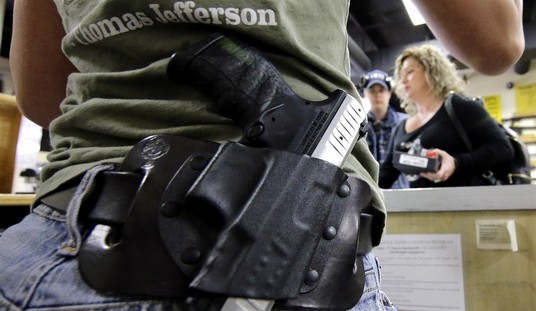You’ve probably never heard of Teddy Valentino Davis until now, but his ongoing criminal cases are a stunning example of both the failures in our criminal justice system and the need to better enforce our existing laws instead of passing new restrictions aimed at legal gun owners.
Davis was originally arrested and charged with carrying a concealed weapon without a license in Detroit, and the judge assigned to his case ordered that Davis wear a GPS monitoring device as a condition of his bond. There’s nothing unusual about that, but what’s raising eyebrows, particularly among local police, is what happened after prosecutors repeatedly told the judge that Davis was violating the terms of his bond, including allegedly taking part in a drive-by shooting.
Davis’ prior alleged tether infractions included a Jan. 18 arrest by Detroit police officials, who say he was carrying a gun that matched 20 shell casings recovered from a drive-by shooting nine days earlier. The GPS unit on Davis’ ankle device tracked him to the crime scene and other shootings, police said.
Davis was charged with the drive-by shooting Jan. 22 and given a personal bond and a tether. But in April, police say he again violated his tether agreement when investigators tracked his device’s GPS to a vacant northwest Detroit house.
Davis and another man were allegedly holed up in the house with multiple firearms. Davis was arrested and scheduled for the May bond violation hearing before [Judge Michael] Hathaway.
So, by the time Davis appeared before the judge in late May, he’d already had five alleged bond violations and two arrests for separate incidents, including the drive-by shooting. The judge could have ordered Davis’ bond revoked and remanded him into custody until his trial, but instead Hathaway took a much different approach: continuing his bond but ordering the removal of the GPS monitoring device that had alerted authorities to his alleged lawbreaking.
As you might have guessed, that didn’t stop Davis’ alleged criminal activity. About a month later police, who were now paying attention to Davis’ social media feeds, watched on Instagram as Davis held a gun and allegedly threatened violence against other individuals.
Davis was arrested June 23 in a Roseville hotel, allegedly with a pistol in his waistband. He is in the Wayne County Jail after Wayne Circuit Judge Miriam Bazzi set bond at $1 million cash during an emergency hearing Friday on the initial concealed weapon charge. In the shooting case, a bond violation hearing is scheduled for 9 a.m. Thursday in Hathaway’s courtroom.
Detroit police officials are furious over Hathaway’s decision to remove Davis’ tether and continue the personal bond, which they say is an example of increased judicial leniency toward allegedly violent offenders.
“Regrettably, low bonds have become the norm in our courts,” Detroit police Chief James White said in a statement. “This is an affront to this city’s community as well as the members of this department that put their lives on the line every day.”
The low bonds are an issue, but they’re not the only problem. The fact that Davis was arrested twice on gun-related charges (including a violent felony offense) and the judge decided the best course of action was to remove his GPS monitoring entirely can’t be blamed on staffing woes or other shortfalls in the local court system. In Wayne County, however, those in charge are pointing fingers rather than accepting responsibility.
But the chief judge of Detroit’s 36th District Court said a hole in the system during prior district court bond hearings may be responsible for the issue. Nobody from police or the Wayne County Prosecutor’s Office showed up to argue about the bond amounts in those proceedings, he said.
“That’s where the process has a hole in it,” Chief 36th District Judge William McConico said. “There’s no (assistant prosecutor) at felony arraignments anymore. About five years back, they used to send people to arraignments from Pre-Trial Services, who would give the judges and magistrates information.”
Wayne County Prosecutor Kym Worthy declined to comment specifically about Davis’ case because it’s still being adjudicated but said she’s “disturbed” by some judges’ recent bond decisions.
“I understand that the pandemic has changed the criminal justice system,” Worthy said in a statement. “In certain non-assaultive cases, there are going to be lower bonds and more personal recognizance bonds.”
“Generally speaking, when there are clear indicators that the person is a danger to others, is charged with another more serious case while on bond, is intimidating witnesses, or is a flight risk, there must be a thoughtfully considered bond that takes these factors into consideration,” Worthy said.
“In certain cases, I have been disturbed when these factors exist and a personal or a very low bond is given,” Worthy said.
Disturbed enough to raise hell about it? Doesn’t sound like it to me.
The sad truth is that while Davis’ case may be particularly egregious, it’s also not that far outside the norm. And while anti-gun politicians are demanding more laws aimed at turning legal gun owners into criminals on paper, they’re awfully quiet about the lackadaisical attitude taken by many judges and prosecutors when it comes to those charged with crimes of actual violence, even when it results in kangaroo court decisions like removing the GPS monitoring of a man accused of taking part in a drive-by shooting while out on bond.









Join the conversation as a VIP Member